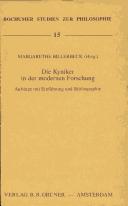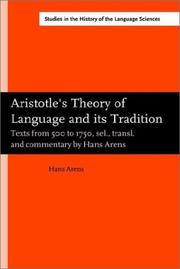| Listing 1 - 5 of 5 |
Sort by
|
Book
ISBN: 9028905413 9026304986 Year: 1980 Publisher: Antwerpen Nederlandsche boekhandel
Abstract | Keywords | Export | Availability | Bookmark
 Loading...
Loading...Choose an application
- Reference Manager
- EndNote
- RefWorks (Direct export to RefWorks)
philosophy --- filosofie --- History of philosophy --- Antiquity --- Filosofie van de Oudheid --- Philosophie de l'Antiquité --- filosofische stelsels --- Plato --- Aristoteles --- Socrates --- ROLDUC-SEMI --- #GROL:SEMI-1'-0/+05' --- #gsdbf --- 14 --- C6 --- Jezuïeten - Belgische provincie (1814-1935) --- Opvoeding, onderwijs, wetenschap

ISBN: 9060323165 9786613328236 1283328232 9027278008 9789060323168 9789027278005 Year: 1991 Volume: 15 Publisher: Amsterdam B.R. Grüner
Abstract | Keywords | Export | Availability | Bookmark
 Loading...
Loading...Choose an application
- Reference Manager
- EndNote
- RefWorks (Direct export to RefWorks)
Die Protestbewegungen und gesellschaftlichen Umwälzungen unserer Zeit haben dazu beigetragen, das Interesse an den antiken Kynikern und ihrer Lehre von der Umwertung aller Werte neu zu wecken. Geprägt durch Diogenes von Sinope und Krates von Theben, seinen markantesten Vertretern, war der Kynismus zu einem wichtigen Bestandteil der griechischrömanischen Popularphilosophie geworden. Zweck dieses Sammelbandes ist es, durch Wiederabdruck wegweisender Beiträge zu Persönlichkeiten, Aspekten und einzelnen Begriffen dieser geistigen Bewegung sowie durch eine kritische Einleitung und eine ausfü
Cynics (Greek philosophy) --- Cynics (Greek philosophy). --- Cynici (Griekse filosofie) --- Cyniques (Philosophie grecque) --- History of philosophy --- Antiquity --- ROLDUC-SEMI --- #GROL:SEMI-1'-04' --- Cynic (Greek philosophy) --- Cynicism (Greek philosophy) --- Cynicism --- Philosophy, Ancient

ISBN: 9027245118 9786613314116 1283314118 9027279942 Year: 1984 Volume: 29 Publisher: Amsterdam ; Philadelphia : J. Benjamins,
Abstract | Keywords | Export | Availability | Bookmark
 Loading...
Loading...Choose an application
- Reference Manager
- EndNote
- RefWorks (Direct export to RefWorks)
This volume contains a fragment from Aristotle's Peri Hermeneias [16a1-17a7], with a translation into English and a commentary. This fragment is crucial to the understanding of Aristotle's thinking about language. It is followed by (translations of) commentaries on Aristotle's text by scholars between 500 and 1750, showing how his text was perceived over time. The commentaries are by Ammonius, Boethius, Abelaerd, Albertus Magnus, Thomas Acquinas, Martinus de Dacia, Johannes a S. Thoma, and James Harris. Each commentary is in turn commented upon by the compiler of this volume.
Language and languages --- Philosophy --- Early works to 1800 --- Aristotle --- Influence --- -ROLDUC-SEMI --- #GROL:SEMI-1-05'-04' Aris --- Foreign languages --- Languages --- -Early works to 1800 --- Aristoteles --- Aristote --- Aristotile --- Contributions in philosophy of language. --- Influence. --- Early works to 1800. --- Philosophy of language --- Historical linguistics --- Langage et langues --- Philosophie --- Ouvrages avant 1800 --- ROLDUC-SEMI --- Anthropology --- Communication --- Ethnology --- Information theory --- Meaning (Psychology) --- Philology --- Linguistics --- Philosophy&delete& --- Aristotle. --- Aristoteles. --- Arisṭāṭṭil --- Aristo, --- Aristotel --- Aristotele --- Aristóteles, --- Aristòtil --- Arisṭū --- Arisṭūṭālīs --- Arisutoteresu --- Arystoteles --- Ya-li-shih-to-te --- Ya-li-ssu-to-te --- Yalishiduode --- Yalisiduode --- Ἀριστοτέλης --- Αριστοτέλης --- Аристотел --- ארסטו --- אריםטו --- אריסטו --- אריסטוטלס --- אריסטוטלוס --- אריסטוטליס --- أرسطاطاليس --- أرسططاليس --- أرسطو --- أرسطوطالس --- أرسطوطاليس --- ابن رشد --- اريسطو --- Pseudo Aristotele --- Pseudo-Aristotle --- アリストテレス
Book
ISBN: 052131450X 0521307333 1139930001 0511941927 1139933647 1139929402 0511870493 1139936840 0511518501 1139939165 9780521314503 9780521307338 9781139939164 9780511518508 Year: 1991 Publisher: Cambridge [England] New York
Abstract | Keywords | Export | Availability | Bookmark
 Loading...
Loading...Choose an application
- Reference Manager
- EndNote
- RefWorks (Direct export to RefWorks)
This long-awaited study of the most enigmatic figure of Greek philosophy reclaims Socrates' ground-breaking originality. Written by a leading historian of Greek thought, it argues for a Socrates who, though long overshadowed by his successors Plato and Aristotle, marked the true turning point in Greek philosophy, religion and ethics. The quest for the historical figure focuses on the Socrates of Plato's earlier dialogues, setting him in sharp contrast to that other Socrates of later dialogues, where he is used as a mouthpiece for Plato's often anti-Socratic doctrine. At the heart of the book is the paradoxical nature of Socratic thought. But the paradoxes are explained, not explained away. The book highlights the tensions in the Socratic search for the answer to the question 'How should we live?' Conceived as a divine mandate, the search is carried out through elenctic argument, and dominated by an uncompromising rationalism. The magnetic quality of Socrates' personality is allowed to emerge throughout the book. Clearly and forcefully written, philosophically sophisticated but entirely accessible to non-specialists, this book will be of major importance and interest to all those studying ancient philosophy and the history of Western thought.
1 <38> SOCRATES --- 1 <38> SOCRATES Griekse filosofie--SOCRATES --- Griekse filosofie--SOCRATES --- #GROL:SEMI-1-05'-05' Socr --- Greek philosophy. --- Socrates. --- ROLDUC-SEMI --- Socrates --- Arts and Humanities --- Philosophy --- Socrate --- Sokrates --- Philosophers --- Philosophy, Ancient. --- Irony. --- Ancient philosophy --- Greek philosophy --- Philosophy, Greek --- Philosophy, Roman --- Roman philosophy --- Sarcasm --- Cynicism --- Rhetoric --- Satire --- Tragic, The --- Understatement --- Sokrat, --- Sokrates, --- Suqrāṭ, --- Su-ko-la-ti, --- Sugeladi, --- Sokuratesu, --- Sākreṭīsa, --- Socrate, --- سقراط, --- Σωκράτης,
Book
ISBN: 9028901434 9789028901438 Year: 1976 Publisher: Antwerpen : Nederlandsche Boekhandel,
Abstract | Keywords | Export | Availability | Bookmark
 Loading...
Loading...Choose an application
- Reference Manager
- EndNote
- RefWorks (Direct export to RefWorks)
filosofie --- conflicthantering --- communicatie --- Didactic strategies --- Philosophy --- Plato --- Philosophy. --- Socrates --- 1 <38> PLATO --- KVH-AND --- ROLDUC-SEMI --- #GROL:SEMI-1-05'-04' Plat --- #GGSB: Filosofie --- #gsdbF --- 141.131 --- gesprekstechnieken --- 371.31 --- 10 --- Plato ca. 428-348 v. Chr. (°Athene, Gr.) --- Filosofie ; Plato --- 1.07 --- Dialectiek --- Mental philosophy --- Humanities --- Griekse filosofie--PLATO --- Didactische werkvormen --- Filosofie --- Filosofie ; filosofen (A - Z) --- 1 --- Socrate --- Socrates Constantinopolitanus Scholasticus --- Aflāṭūn --- Aplaton --- Bolatu --- Platon, --- Platonas --- Platone --- Po-la-tʻu --- Pʻŭllatʻo --- Pʻŭllatʻon --- Pʻuratʻon --- Πλάτων --- אפלטון --- פלאטא --- פלאטאן --- פלאטו --- أفلاطون --- 柏拉圖 --- 플라톤 --- 1 <38> PLATO Griekse filosofie--PLATO --- Plato, --- Plato. --- Socrates. --- Platon --- Platoon --- Платон --- プラトン --- C6 --- Opvoeding, onderwijs, wetenschap --- Plato - Dialogues --- Sokrates
| Listing 1 - 5 of 5 |
Sort by
|

 Search
Search Feedback
Feedback About UniCat
About UniCat  Help
Help News
News